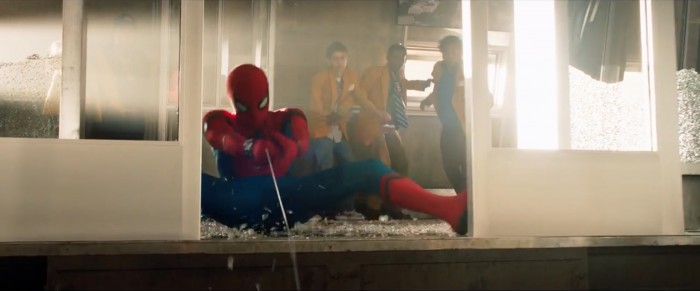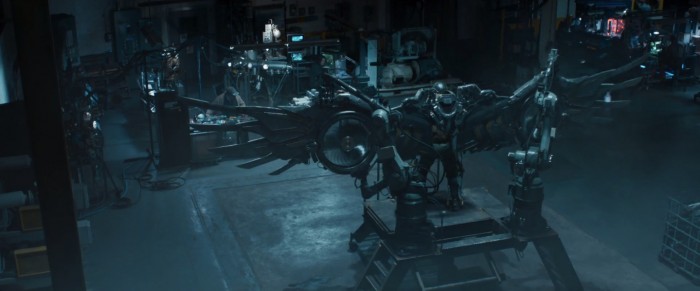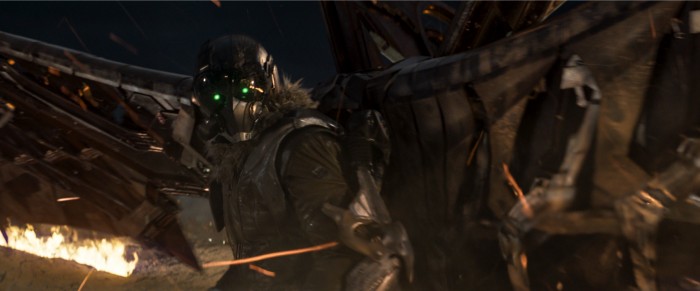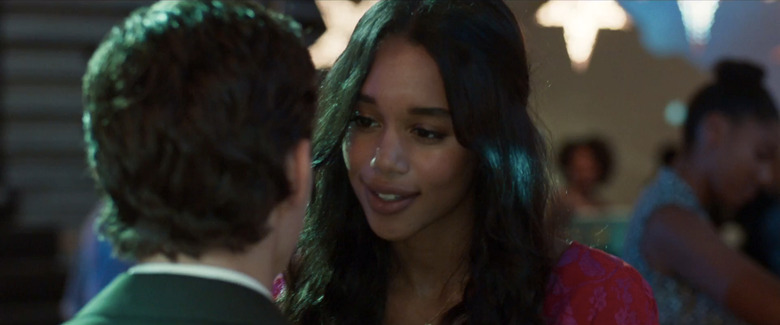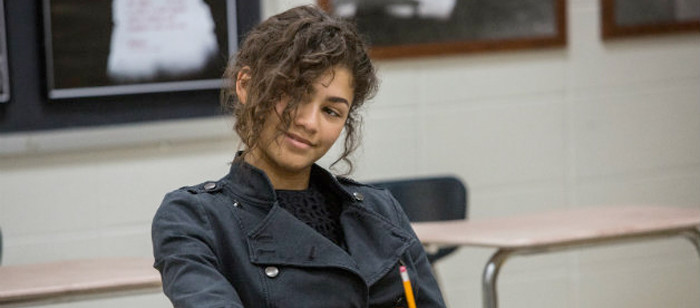'Spider-Man: Homecoming' Spoiler Review: Diversity Fuels The Best Spider-Man Movie Yet
(In our Spoiler Reviews, we take a deep dive into a new release and get to the heart of what makes it tick...and every story point is up for discussion. In this entry: Jon Watts' Spider-Man: Homecoming.
The hype is real — Spider-Man: Homecoming is definitely the best Spider-Man movie made to date. The film, which stars Tom Holland as a fresh-faced Peter Parker, gives us our best version of the character as well as the most realistic, most diverse on-screen version of Queens in a Spider-Man film. There are a ton of positives with this film, as well as some food for thought, so without further ado, let's get into it.
Spider-Man: Homecoming Recalibrates the Entire MCU
Spider-Man: Homecoming might be part of the Marvel Cinematic Universe's Phase 3, but I'm considering it the second phase of evolution in Marvel's storytelling ability. As we've gone along the MCU journey, we've seen the films get more and more...dudebro. That doesn't mean that the films aren't fun, but the storytelling has definitely begun to suffer from formulaic sameness — just take a look at Guardians of the Galaxy: Vol. 2 and the trailer for Thor: Ragnarok. Everything from the tone, the retro music selection, and even the films' logos suffer from Marvel doing things that have worked in the past too doggone much. Ditto for the MCU's overwhelming white male centrism. Again, the focus on the heroic white male archetype puts the films into staid, dudebro territory. With such adherence to a certain formula, especially during the last few films, it's felt like Marvel's telling the same story over and over again.
However, Spider-Man: Homecoming injects much-needed zest and freshness into the MCU. Instead of focusing on the same "I'm amazing at everything" heroic archetype, we're focusing on a kid who is so eager to be a part of the big leagues of superheroism, the Avengers. Peter Parker's appeal in the comics is that he's a kid who is trying to juggle life like the rest of us, and just like us, he makes oodles of mistakes along the way. Most of Peter's fights in this film largely consists of him making huge mistakes, and seeing a superhero flail along in his journey is not only humorous in its own right, but also relatable.
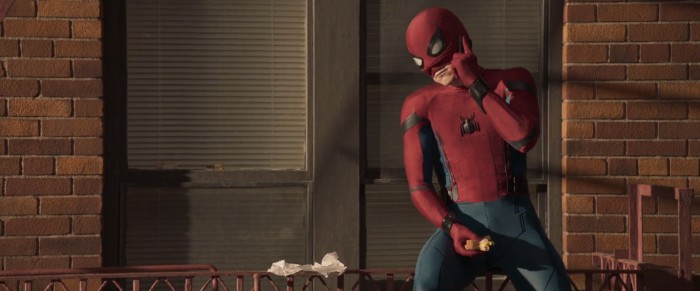 Spider-Man: Homecoming also lifts the tone of the Marvel franchise, which has so far wavered between balls-to-the-wall comedy and seriousness (all set to big budget action sequences, of course). In Spider-Man: Homecoming, we spend the movie with Peter and a ton of relatable, lovable kids (even Tony Revolori's pseudo-bully Flash is lovable in his own way). Showing Peter's high school was a much-needed reprieve from maniacal robots, Norse gods, time control, and Captain America's drama with Bucky. (We do see Chris Evans' Cap in this film, though, but in the form of government-backed PSAs about national fitness challenges and staying out of detention.) As many outlets have already said, the film's light-yet-earnest tone was something straight out of a John Hughes movie, and that approach was the shot in the arm Marvel Studios sorely needed.
Spider-Man: Homecoming also lifts the tone of the Marvel franchise, which has so far wavered between balls-to-the-wall comedy and seriousness (all set to big budget action sequences, of course). In Spider-Man: Homecoming, we spend the movie with Peter and a ton of relatable, lovable kids (even Tony Revolori's pseudo-bully Flash is lovable in his own way). Showing Peter's high school was a much-needed reprieve from maniacal robots, Norse gods, time control, and Captain America's drama with Bucky. (We do see Chris Evans' Cap in this film, though, but in the form of government-backed PSAs about national fitness challenges and staying out of detention.) As many outlets have already said, the film's light-yet-earnest tone was something straight out of a John Hughes movie, and that approach was the shot in the arm Marvel Studios sorely needed.
To top it off, we also spend time in the lived-in borough of Queens, a move that successfully ties Spider-Man to Netflix's Luke Cage, which focused primarily on Harlem. Both properties fully immerse the viewer in these neighborhoods, making us care even more about the superheroes and the people they fight for.
Case in point: when sandwich shop Delmar's blew up due to the Vulture's (Michael Keaton) alien/human hybrid technology, wasn't it like seeing Ghengis Connie's get destroyed by Cottonmouth? You cared about the wellbeing of these ordinary citizens, and that pathos is at the center of why the "on-the-ground" like Spider-Man and Luke Cage do what they do. These two are the heart of their communities, a point driven home to hilarious effect when Spider-Man is shown giving a woman directions. Seeing homegrown heroes do their thing will never not be fun to watch.
All Too Human
For all the levity and high school nostalgia inherent in Spider-Man: Homecoming, there are also very real stakes. Part of the reason the stakes feel higher than other Marvel films is because, again, Peter's situations are relatable. How can he save the world while staying in school and meeting all of his familial obligations? As Peter mentions in the film, his aunt May (Marisa Tomei) has already been through a lot (thankfully, we don't get into any Uncle Ben drudgery), and the last thing Peter wants to do is worry his remaining guardian into an early grave.
Possibly the highest of the stakes comes not when Peter's trying to save the people on a ferry boat that's been split in half by the Vulture's tech (although things are pretty high-key) — it's when Peter realizes that the father of Liz (Laura Harrier), the girl he's in love with, is none other than the Vulture himself, otherwise known as Adrian Toomes, a family man who's trying to provide for his wife and kids while protecting them from his illegal doings.
Peter's not only faced with the task of catching the bad guy, but he's caught in a moral dilemma about whether he'll let the Vulture go for Liz's sake and become morally corrupt, or if he'll do his job and send a man whose livelihood was taken away (by none other than Peter's hero and father-figure Tony Stark, played by Robert Downey Jr.). All the Vulture wants to do is support his family, and utilizing his tech skills for lucrative, illegal deals was the only way he saw forward. You feel for both Peter and Adrian, who are both men who want to do right by the people they love.
The Vulture might also be the most realized Marvel villain yet. So far, most of the great villains have been found to varying degrees in Marvel's TV showings, with one of the most notable being Luke Cage's Cottonmouth. If we're going by films, the most relatable villains thus far have been Thor's Loki and Captain America: Civil War's Zemo (if we're not counting Cap himself as a villain in this film, since he knew about the fate of Tony Stark's parents the entire time). But overall, Marvel has not done well with their villain characters (the most cartoonish of them being Ultron). Where Marvel had success with the Vulture — and to a certain extent, Zemo and Cottonmouth — was showing the vulnerabilities and human motivations behind characters who could have been written as moustache-twirling cartoons. If Marvel puts the same level of detail in their future villains, we as viewers might get some much-needed relief from evildoers with little to no realistic motivations.
New York is Finally a Melting Pot
Representation — the buzzword of the day, but serious business for viewers and studios alike — is both praiseworthy and thought-provoking in this film.
Let's start with the positives. What's great is that most of the cast are people of color — Zendaya plays a charmingly weird Michelle (who, surprise surprise, goes by "MJ"), Revolori and Harrier lead the cast of secondary kid characters (which includes none other than Beasts of No Nation's Abraham Attah), and the faculty of Peter's school include comedian Hannibal Burress as the school coach, Orange is the New Black's Selenis Leyva as one of Peter's teachers, and Kenneth Choi as the principal. Even Adrian's wife and Liz's mom, Doris, is played by Garcelle Beauvais. Peter's best friend, Ned (Jacob Batalon), is one of the few major Asian film characters in the MCU, and his presence gives the film even more levity and fun. Donald Glover, who originally rallied fans in a campaign for the role of Peter Parker in a future Spider-Man film, shows off his comedic chops in a few key scenes. Marvel's goal was to showcase Queens' diversity, and they most certainly did with this film. Even a cameo of a girl in a hijab goes far with audience members who are tired of seeing themselves painted as terrorists in the media.
Secondly, the fact that Peter is in love with a Liz — a biracial black girl in this film — and is set to be in love with Michelle/MJ in future films (if the MCU holds to the canon in that regard, despite totally doing away with the original Mary Jane character in the franchise), is a major milestone for Marvel's film franchise, which is currently up to its eyeballs with white female love interests. Am I saying white girls can't be love interests? Of course not. But the rest of us need to see ourselves as viable too, and black girls (and girls of color in general) often go underrepresented. It's very gratifying to see that Peter's love interests also reflect the diversity found in Queens.
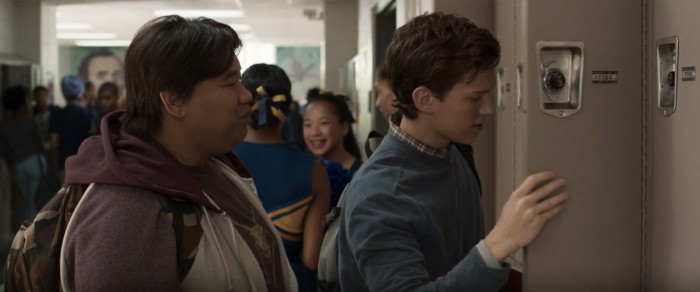
However, no film is perfect, and neither is Spider-Man: Homecoming. While the cast is very much diverse, there are still some old Marvel-isms at play. The main point of criticism is that it's still a story centered around a white male protagonist. Marvel's got a glut of films that focus on white men, and while Peter Parker is an endearing boy, he still falls in the same line-up of the other white Marvel heroes.
This point is underscored by the fact that quite a lot of this film features cues and material lifted from the story of Miles Morales, the "Ultimate" Spider-Man from the Marvel comics and a biracial teenager superhero. The comics featuring Morales as the main character features a diverse cast of characters including Miles' best friend, an Asian boy named Genke. Genke looks and acts suspiciously like Ned, which leads some, such as The Root's Jason Johnson, to ask why this wasn't Miles' movie in the first place. Some might say, Miles is referenced in this film, since Glover's low-rate criminal character Aaron Davis is actually Miles' uncle and, indeed, Aaron does mention that he has a nephew he wants to keep safe. But now the question is how does Miles fit into this new story that, some might argue, is retrofitted around Miles' existing comic book story?
Lastly, the film's POC characters are still secondary. Yes, they have lines and are allowed to emote, but they could still be viewed as glorified set decoration. Even Ned, who gets the most screentime out of the high school kids, is still in an "ethnic sidekick" capacity, much like how Marvel treats Cap's relationship with Falcon, Iron Man's relationship with War Machine, or Ant-Man's relationship with every ethnic and racial stereotype that made up his rag-tag gang of criminals-turned-heroes.
With that being said, though, Marvel could have very easily made the Queens presented in Spider-Man: Homecoming the same Queens that has been presented in other Spider-Man films before — a Queens where only one or two people of color exist, instead of being the actual convergence of cultures and races that it is. The film could have had Attah, Revelori, Batalon, and Harrier's characters all be white, and then we would be condemning the movie for that reason as well.
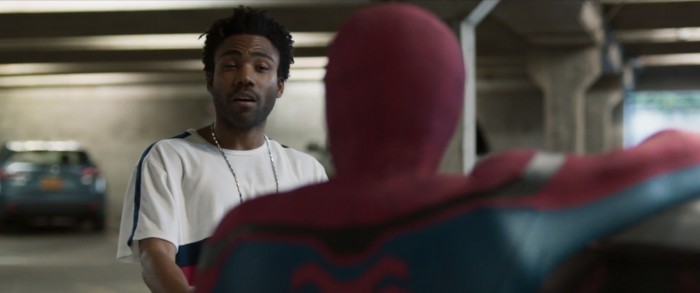
To that end, I'm sure some of you reading this might be like, "Well WTF?! You're damned if you do, damned if you don't." That's what comes with the territory of telling a story. Your strengths and your biases will always come out, even in the most earnest and well-meaning of films. All a storyteller can do is learn what they can from the plusses and minuses of their story and apply it in the future.
Marvel has taken a beating in recent months due to Iron Fist, Doctor Strange, and allegations of whitewashing. Even before then, fans were berating Marvel to put a Black Panther film into motion. To its credit, Marvel seems to be taking these concerns as seriously as it knows how given its biases, what with Black Panther less than a year away from its theatrical release and with the effort that was put into Spider-Man: Homecoming to create a realistic Queens. To that end, I say that Marvel successfully put their foot into showcasing diversity and inclusion in this film and for that, it should be lauded.
However, Marvel's learning curve with diversity and representation is far from over, and there will be many more instances in which Marvel will learn something new in regards to how it approaches representing the world more thoughtfully. But for right now, I'm willing to give Marvel its much-deserved clap on the back for its efforts in Spider-Man: Homecoming.
Can Marvel Keep Going in This Direction, Please?
Despite some food for thought representation-wise, Spider-Man: Homecoming does represent a turning point in Marvel's storytelling ability and focus. Sure, Thor: Ragnarok is coming out after this movie, which might make progress a stop-and-start affair depending on how good Thor: Ragnarok is. But it seems like Spider-Man: Homecoming has much more in common with its blacker cousins Luke Cage and the soon-to-be-released Black Panther. Like those projects, Spider-Man: Homecoming takes a fair amount of consideration as to how it's going to portray its world and relate to its audience. The film is also much more about developing depth of character than it is about big action sequences, and when there are big action sequences, they continue to drive the story instead of act merely as a paint-by-numbers set piece. Overall, the film is a great addition to the MCU and if you're a Marvel fan or a fan of fun movies in general, it would serve you right to take in a viewing.

